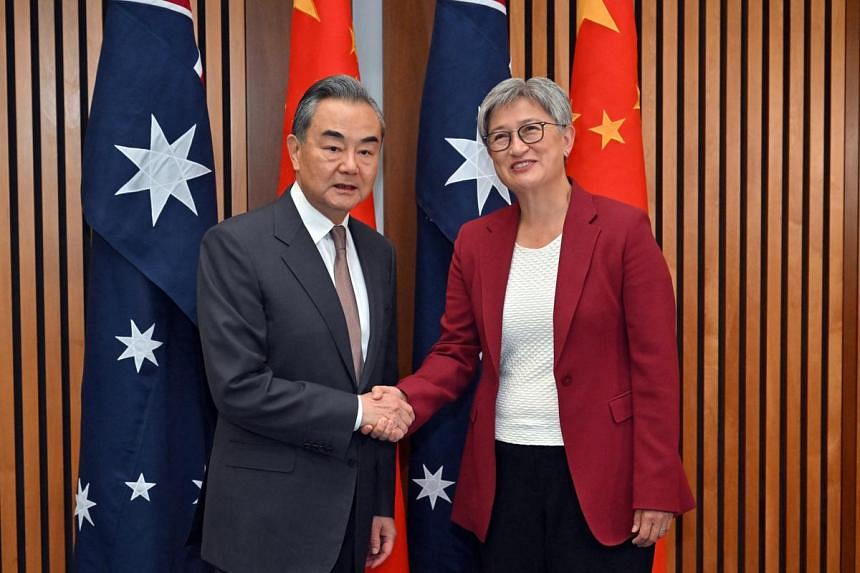CANBERRA – Australia will prepare for a visit by China’s Premier Li Qiang in 2024, Australian Foreign Minister Penny Wong said after meeting her Chinese counterpart Wang Yi in Canberra for talks she said covered human rights, tariffs, regional security and pandas.
Australia and China, its largest trading partner, are rebuilding ties after a period of strained relations which hit a low in 2020 after Canberra called for an independent investigation into the origin of Covid-19.
Beijing responded by imposing tariffs on billions of dollars worth of Australian commodity imports, most of which have been lifted since a change of government in Canberra two years ago.
“I look forward to speaking frankly with you about Australians detained in China, human rights, maritime security and safety, as well as regional and international issues, such as the Pacific, Russia’s invasion of Ukraine and the conflict in the Middle East,” Ms Wong said in her opening remarks.
After the meeting, she addressed Chinese and Australian reporters, and said the two nations would work to prepare for a visit by Mr Li, emphasising the importance of face-to-face diplomacy to better understand each other.
Australia and China would expand dialogue on the Pacific, and on climate and energy cooperation, Ms Wong said.
“I expressed our serious concern about unsafe conduct at sea, our desire for peace and stability across the Taiwan Strait and in our region,” she said, a reference to friction with China’s navy in the South China Sea.
While Beijing has made an interim decision to remove Chinese tariffs on Australian wine – one of the commodities hit by import charges after 2020 – Ms Wong said Australia also wanted blocks lifted on beef and lobster, and they had discussed nickel market volatility.
Ms Wong said she raised the case of Yang Hengjun, an Australian writer who was given a suspended death sentence by a Beijing court in February, and told Mr Wang Australians were shocked by the sentence.
In another sign that diplomacy was back on track, Ms Wong said it was likely two pandas on loan from China since 2009, and due to return in 2024, would have their stay in her home city of Adelaide extended.
“We are on a good path there to continued panda presence,” she told reporters after the meeting.
‘Mutual respect, common ground’
According to a Chinese foreign ministry statement, Mr Wang said he hoped Australia would take measures to uphold the principles of the market economy and provide a non-discriminatory business environment for Chinese enterprises in Australia.
Canberra screens foreign investment in key sectors for national security, including critical minerals, and has blocked some Chinese deals.
He highlighted the need for independence, a likely reference to China’s view that Australia’s foreign policy is dominated by Canberra’s strategic alliance with the United States, and said China-Australia relations are on the right track and should not go backward.
A reference to Australia needing to have an independent foreign policy that appeared in the Chinese foreign ministry’s first Chinese language statement did not appear in a longer version issued later.
“The most fundamental thing is to insist on mutual respect, the most crucial thing is to insist on seeking common ground while reserving differences, the most important thing is to insist on mutual benefit and win-win situation, and the most valuable thing is to insist on independence and autonomy,” he said according to the transcript.
The last time a Chinese foreign minister visited Australia was in 2017 and Mr Wang’s visit signals a thaw in diplomatic ties.
Mr Wang also met with Australian Prime Minister Anthony Albanese, and held a private meeting with 11 business, university and think-tank representatives.

The Australia China Business Council’s national president David Olsson said afterwards that the discussion had reflected “a diverse range of views and voices from the Australian side, reflecting the conversations that are taking place in Australia about the future direction of the bilateral relationship”.
Rio Tinto iron ore chief Simon Trott said China was the biggest customer of Australia’s iron ore, and ongoing stabilisation of ties had led to “increasingly positive dialogue between governments and business leaders of both countries”.
Mr Wang will meet former Australian Prime Minister Paul Keating, a prominent supporter of China who has criticised Australia’s Aukus nuclear-powered submarine deal with the US, on March 21. REUTERS

